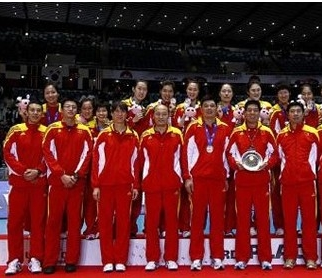
Clad in red and gold, China's Olympic athletes may still intimidate the competition in London. Many were selected as young as 6 years old to become Olympians and have spent most of their lives in government-subsidized schools and gyms training to win a medal for their country.
身着红金两色运动服的中国奥运会运动员在伦敦仍将给同场竞技的对手造成压力。很多中国运动员6岁就被选出来培养成为奥运选手,他们的大部分青春都是在政府出资建设的体校和体育馆里度过的。漫长的训练就是为了能给国家赢得一块奥运奖牌。
Yet this year, China looks to suffer declines in several sports where long-term domination appeared inevitable, including gymnastics, shooting and judo. It also doesn't figure to improve much in the medal-rich sports where it has been weak, such as swimming and track and field.
但是今年,中国可能会在多个常年保持优势的项目上出现较大滑坡,包括体操、射击和柔道。在游泳和田径等奖牌大户但中国实力薄弱的项目上,中国也没有找出太多改进的方法。
Top Chinese sports officials aren't boasting about their medal chances in London, declining interviews with The Wall Street Journal and playing down expectations in the state-controlled domestic media.
中国最好级别的体育官员并没有吹嘘中国代表团在此次伦敦奥运会上争取奖牌的机会有多大,同时拒绝接受《华尔街日报》的采访,还通过本国官方媒体降低外界对中国代表团表现的预期。
'In the past four years, other countries and regions have prioritized Olympic preparations,' Liu Peng, head of the Chinese General Administration for Sport, told state-run China Daily earlier this month. 'We have to be fully prepared for all the difficulties and challenges.'
中国国家体育总局局长刘鹏本月早些时候接受《中国日报》(China Daily)采访时说,过去四年中,其他国家和地区都将备战奥运会当作重中之重,我们必须为所有困难和挑战做足准备。
Wall Street Journal projections show China winning 38 gold medals and 92 overall, down from 51 and 100 in 2008.
《华尔街日报》的预测表明,中国在此次伦敦奥运会上将赢得38枚金牌,奖牌总数为92枚。而2008年中国摘得的金牌数为51枚,奖牌总数为100枚。
The Big Letdown
巨大落差
It's common for Olympic hosts to show a slump in the medal tallies four years after their own Games. Like most former hosts, China seems to have slowed its investments in facilities and training, with some exceptions like a $100 million investment in a state-of-the-art pentathlon training facility in Chengdu.
奥运会东道主在承办完比赛后的下一届奥运会上奖牌总数出现较大下滑并不罕见。和此前大多数奥运会承办国一样,中国似乎放缓了在体育设施和训练上的投资,不过也有一些例外,比如在成都投资1亿美元兴建的先进的现代五项运动训练中心。
Another big factor at work: China's changing population has more economic options these days伟and the state's rigorous Olympic training doesn't look as appealing as it used to.
导致这一现象的另一大因素是:人口结构的变化使得如今的中国人在经济上有更多选择。在中国人看来,为备战奥运会而进行的严格训练如今看来不像过去那样有吸引力。
Chinese athletes with Olympic medal potential see little of their families, and many of the most basic aspects of their lives are directed by the state. At the national training center in Beijing, officials stipulate athletes can eat food only from the center's canteen - even on their days off - out of concerns that tainted meat could cause athletes to fail drug tests, according to the state-run China Daily. (Officials didn't respond to questions about athletes' diets.)
有希望在奥运会上摘金夺银的中国运动员很少同家人见面,其生活中很多最基本的方面都要听从国家指示。据《中国日报》报道,在北京的国家训练中心,有关负责人规定运动员只能在训练中心食堂用餐,哪怕不在训练期间也是如此。这是因为有关部门担心受污染的肉类可能导致运动员无法通过药检(相关负责人没有回应记者提出的有关运动员饮食方面的问题)。
Indeed, some Chinese Olympians paint a painful picture of life inside the sports system. 'We all lacked freedom as athletes,' says Guo Jingjing, who retired in 2011 after winning four gold medals in diving at the Beijing Games. 'You begin so young that you know little else.'
事实上,按照一些中国奥运选手的描述,在体育系统内部的训练生活非常痛苦。2011年退役的郭晶晶说,作为运动员,我们全都缺乏自由,从很小就开始训练,对其它事情了解很少。郭晶晶在北京奥运会上赢得了两枚跳水金牌。
The pressure is intense, Guo says, but it helped the Chinese win so many gold medals in 2008. 'Americans get so nervous at competitions,' she says.
郭晶晶说,压力非常大,但靠压力中国人在2008年赢得了那么多的金牌。她说,美国人在比赛时非常紧张。
A Rounded Approach
全能选手
But pressurized training may not be enough this time around. China won the gymnastics team gold in 2008, for instance, but will fight to even win bronze in London. Why? Because China isn't cultivating the same kind of young, all-around athletic talent as the favored U.S., where sports are the main extracurricular activity for millions of children.
但现在仅高强度训练是不够的。例如,中国在2008年赢得了体操团体项目金牌,但在伦敦拿铜牌都比较困难,为什么呢?因为中国没有像夺冠希望较大的美国那样培养出年轻的全能型体育人才。在美国,体育运动是数百万儿童的主要课外活动。
U.S. gymnasts, like so many members of the U.S. Olympic team, benefit from a sports culture that encourages children to play multiple sports from an early age. A quarter of China's medals in 2008 came from shooting, table tennis and badminton, sports that aren't known for attracting the world's greatest all-around athletes.
美国体操运动员和美国奥运代表团中的许多其他成员一样,都受益于一种鼓励儿童从小从事多种体育运动的文化。2008年中国获得奖牌四分之一都来自射击、乒乓球和羽毛球,这些项目对于世界上最优秀的全面发展的运动员来说,吸引力不是很大。
Lu Shanzhen, chief coach of the Chinese women's gymnastics team, says China doesn't 'do very well in training all-around athletes' compared with the U.S.
中国女子体操队总教练陆善真说,和美国比起来,中国对全能型运动员的培养做得不是很好。
'Their competition system and training system requires all young athletes to participate in all-around competitions,' he says.
他说,他们的比赛制度和训练制度要求所有年轻运动员都参加全能项目。
At China's sports schools, only recently has the emphasis shifted to graduating all-around athletes. 'There has been a big debate in China for years about the overemphasis on the pursuit of gold medals,' says Susan Brownell, a professor of anthropology at the University of Missouri, St. Louis, who has written extensively about Chinese sports. 'The whole debate has become more about expanding opportunities for the general populace.'
中国的体育运动学校直到最近才把重心转移到全能型运动员的培养上面。密苏里大学圣路易斯分校(University of Missouri, St. Louis)人类学教授布劳内尔(Susan Brownell)曾大量撰文讨论中国体育。她说,几年以来,中国国内一直在讨论过分注重金牌的问题;整个讨论的重点,已经是如何为大众拓展机会。
Better than Big
文武双全
In fact, China's top leadership has set a goal to transform China from a 'large athletic country' to a 'strong athletic country.' Since 2010, schools like Beijing Shichahai Sports School, which has produced 33 world champions, have been required to spend more time on academics and less on hard training. The goal is to better prepare the students岸many of whom won't make it in into China's national team or into professional sports岸for a mainstream life and job, and to make sports schools more attractive to new talent as the schools face declining interest.
事实上中国高层领导人已经设定了一个将中国从“体育大国”转变为“体育强国”的目标。从2010以来,像培养了33位世界冠军的北京什刹海体育运动学校等,已被要求增加文化课程学习时间,减少用于艰苦训练的时间,目的是让学生更有条件融入主流社会的生活与工作,因为很多人是进不了国家队,也进不了职业体育运动队的。另外的一个目的是在人们对体校兴趣下降之际,增强这些学校对于新人才的吸引力。
Tian Junlin, a badminton coach at Shichahai, says the new focus on academics has also had noticeable impact on athletes on the court that could pay off down the road. 'It helps them develop critical thinking and strategy,' Tian says. 'This is really good, especially for ball-related sports.'
什刹海体校羽毛球教练田俊林(音)说,对文化课的重视也对训练场上的运动员产生了明显的影响,将来可能会有好处。田俊林说,文化课有助于学生培养批判性思维,形成自己的战略,这是非常好的,特别是对球类运动来说。












